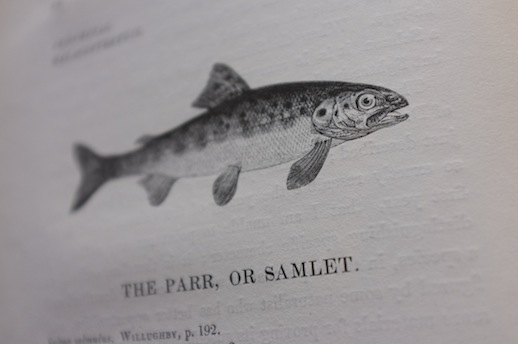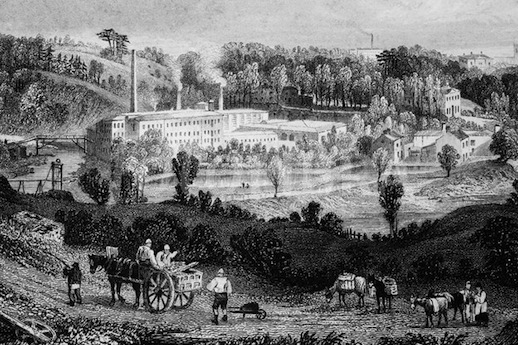By Charles Rangeley-Wilson, originally published on his blog, December 20, 2013. Used with the permission of the author.
It would be difficult to get further from the sea as the crow flies, let alone as the salmon swims, than Rowsley in Derbyshire, but salmon parr have been found there for the first time in 200 years. The presence of parr (young salmon that hatched in the spring of this year or the year before) in the River Wye on the Haddon Estate is a certain sign that adult salmon have returned to spawn in a river where they have not been seen since the early Nineteenth century. A certain sign also that the parents of these fish swam 140 miles through the English Midlands, past Kingston-upon-Hull, Scunthorpe, Gainsborough, Newark, Nottingham, Derby and Matlock to reach the clean and rapid waters of the Wye and spawning grounds fit for fish that do not tolerate pollution.
The Derbyshire Wye was once home to prolific runs of Atlantic salmon, but the effluent and mills of our Industrial Revolution drove them to extinction in this and many other English rivers. Even if the waters of the upper Wye remained clean enough for salmon to breed in, changes downstream on the Derwent and Trent, made any return journey all but impossible for over two centuries.
However, water quality has improved greatly in recent years – and the increasing presence of salmon is a sign of this, as is the return of osprey and otters to the same area – while the industrial mills whose dams and sluices made the salmon’s spawning journey all but impossible have closed down one by one. Easing the upstream journeys of migratory fish past weirs, locks and sluices is now a major concern of the Environment Agency and Rivers Trusts. The salmon’s return to the Derbyshire Wye, a clean and healthy limestone stream in which trout and grayling thrive, is a sign that these efforts are paying off.
Meanwhile on the open sea the campaign championed by Orri Vigfusson and the North Atlantic Salmon Fund to buy up fishing rights from commercial trawlermen is saving tens of thousands of these iconic fish from the nets. It is almost all good news. Except that for every 1000 fish voluntarily spared by Faroese netsmen, 980 are taken by Scottish netsmen in a netting operation sponsored by generous grants from the EU. “Many of these fish would be destined for east coast English rivers like the Tyne and Tees,” said Orri Vigfusson. “But who knows? Maybe some are also bound for the Derwent and Wye, rivers that are just recovering and that cannot spare the indiscriminate slaughter of their tiny populations of salmon.”

